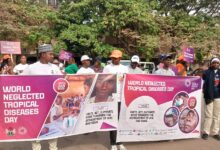Tuberculosis: WHO Promises Support, As Nigeria Tackles Disease

The World Health Organisation (WHO) has reaffirmed its commitment to support the country in eradicating Tuberculosis (TB), one of the top infectious killer diseases in the world.
The Deputy Country Representative of WHO, Mr. Chimbaru Alexander in his goodwill message at the 2021 National TB conference in Abuja on November 09, 2021 said WHO as a technical partner will continue supporting the National TB program at all levels.
TheFact Nigeria gathered that there has been increase in the number of people being diagnosed with TB due to the country’s weak healthcare system.
The three-day conference; 9 to 11 November 2021. with the theme “Sustaining A Resilient TB Response in Nigeria: Addressing The Impact of COVID-19 and Other Diseases” organized by the Stop TB Partnership Nigeria in Collaboration with the National Tuberculosis and Leprosy Control Programme (NTBLCP) and other partners was aimed at providing a platform for all TB stakeholders to deliberate on the magnitude and dimensions of the effects of TB pandemic in Nigeria.
Nigeria recorded a gain in its fight against TB in 2020, controversially, She ranked sixth among 30 TB High Burden countries in the world and has the highest burden in Africa. Hence the necessity for continuous strategic intervention by the federal government, the WHO, and partners to reduce the burden of the disease in the country by 2030.
In the quest to reduce the burden of the disease in Nigeria, Mr Chimbaru said:
“WHO has supported the government to develop guidelines, Standard Operating Procedures, adopt new strategies, regimen, and interventions in addition to building capacities and enhancing data analysis and use for optimizing performance.”
“We will also support the country in the implementation of the multisectoral approach towards ending TB epidemic in Nigeria.
Tuberculosis remains a major public health problem globally and is one of the leading causes of death worldwide. An estimated 9.9 million people developed TB in 2020, with Nigeria having the highest number of TB cases in Africa and accounting for 4.6% of the Global TB burden (WHO Global TB report 2021).
While speaking at the event, the Minister of Health, Dr. Osagie Ehanire, portrayed the impact of the COVID-19 pandemic on TB control in Nigeria.
He said: “The advent of COVID19 pandemic and its control measures impacted many aspects of human endeavor, including health services, and in some cases reversed gains made over the years in aspects of health programs that affected TB control.
“The first COVID19 case was diagnosed on February 27, 2020 and measures to control the pandemic were introduced, with eventual lockdown in Quarter 2 (Q2), 2020.
“Nigeria recorded a 30% reduction in GeneXpert testing in the first week of the lockdown, the number of notified TB cases also dropped by 17% from 33,119 TB cases in Q1, 2020 to 27,353 in Q2,2020.
“This necessitated the conceptualization and implementation of innovative interventions to ensure program sustainability and mitigate the impact on TB control efforts, the implementation of which resulted in an eventual 15% increase across the country, in the number of TB cases notified from 120,266 TB cases in 2019 to 138,591 TB cases in 2020, making us one of the few countries that recorded an increase in TB notification in 2020, despite the pandemic”, Ehanire said.
The Health Boss however disclosed that the country was gradually overcoming the TB burden. He said:
”I am delighted to also let you know that nine months into this year 2021, we have already surpassed the total number of TB cases notified in all of 2020 by about 7%, and for the first time, Nigeria could be notifying up to 200,000 TB cases by the end of 2021.”
TB remain a major public health problem globally and is one of the leading causes of death worldwide. An estimated 9.9 million people developed TB in 2020, with Nigeria having the highest burden of TB in Africa and accounting for 4.6% of the Global TB burden (WHO Global TB report 2021).






